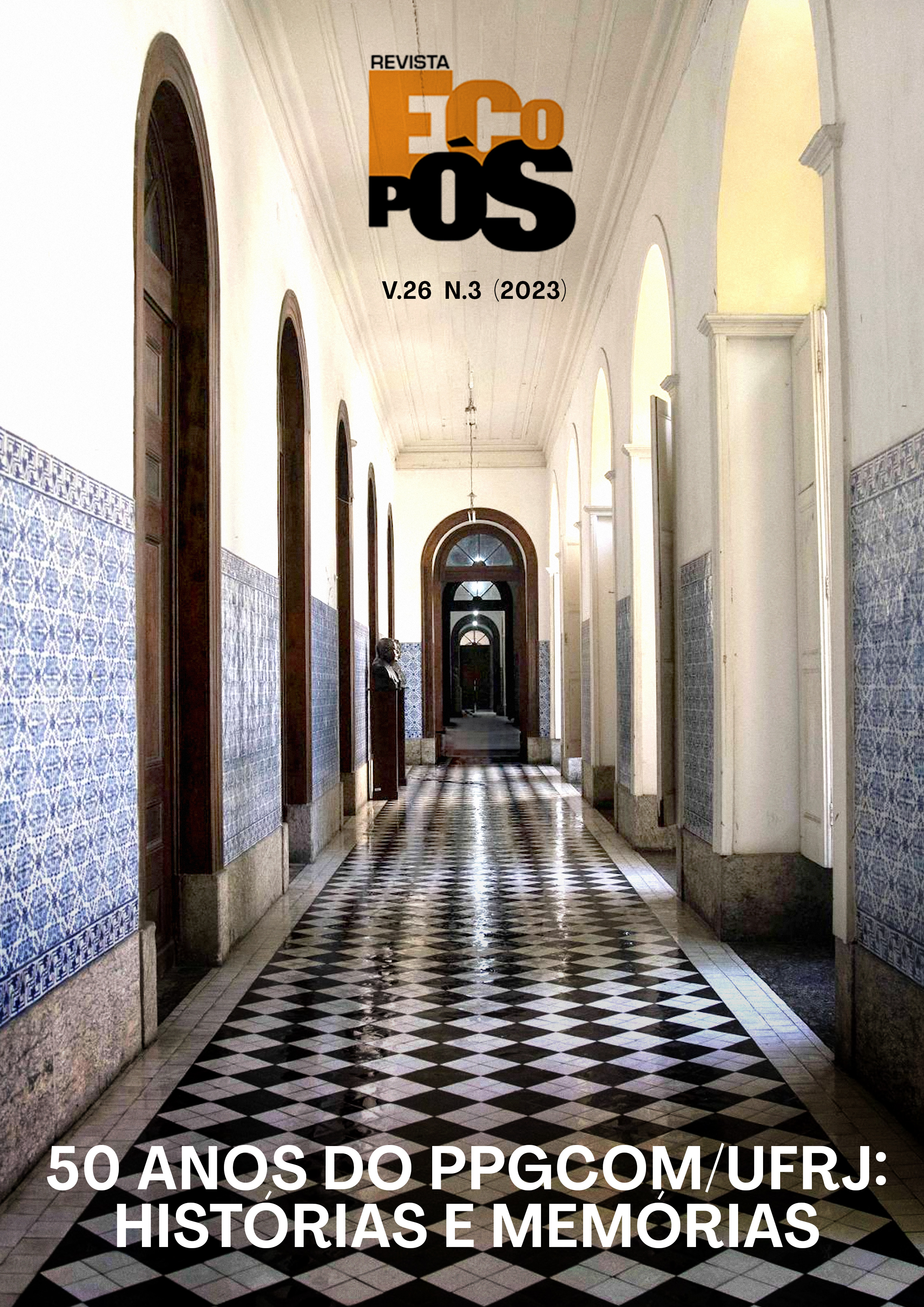A desordem do bolsonarismo
análise discursiva dos tuítes de extrema direita durante o segundo turno das eleições de 2022
DOI:
https://doi.org/10.29146/eco-ps.v26i3.28158Palavras-chave:
comunicação e política, segundo turno das eleições de 2022, tuítes e discursos, circuitos dos afetos, extrema direita, circuit of affections, extreme rightResumo
A disputa presidencial entre Bolsonaro e Lula em 2022 foi marcada por querelas de sentido e polêmicas; do lado da extrema direita, estas foram centradas não em projetos de governo, mas em torno da definição do próprio regime democrático. A fim de localizar os discursos, principalmente circulados por políticos e influenciadores bolsonaristas, analisamos um corpus de publicações em perfis de 19 figuras da extrema direita no Twitter, durante o segundo turno das eleições. Mapeamos contratos de comunicação e discursos que atravessaram as mensagens mais retuitadas de cada emissor, identificando respectivas intensidades passionais que perfilaram as interações, a fim de examinar as consequências políticas para o contexto democrático. Utilizamos as abordagens da análise discursiva de Laclau e estudos sobre extrema-direita de Nunes, Prado, Demuru e outros. Que consequências isso traz para o país nessa nova fase de poder que se iniciou em 2023?
Downloads
Referências
ACKER, Antoine. How Fascism Went Digital. A Historian's Perspective on Bolsonaro's Victory in Brazil. In: Geschichte der Gegenwart, 2018. Disponível em: <https://geschichtedergegenwart.ch/?s=How+Fascism+Went+Digital&category_name=&submit=Suchen>. Acesso em: 02 maio 2023.
BENKLER, Yochai; FARIS, Roberto; ROBERTS, Hal. Network Propaganda: Manipulation, Disinformation and Radicalization in American Politics. Nova York, NY: Oxford University Press, 2018.
CASARÕES, Guilherme; MAGALHÃES, David. The hydroxychloroquine alliance: how far-right leaders and alt-science preachers came together to promote a miracle drug. In: Revista de Administração Pública, RAP, 55. Rio de Janeiro: FGV, 2021, p. 197-214.
CESARINO, Letícia. Identidade e representação no bolsonarismo. In: Revista de Antropologia, v. 62, n. 3, p. 530-557, 2019.
CESARINO, Letícia. "How social media affords populist politics: remarks on liminality based on the Brazilian case". In: Trabalhos em Linguística Aplicada, 59. Campinas: 2020, p. 404-427.
CHARAUDEAU, Patrick. Discurso das mídias. São Paulo: Contexto, 2007.
da EMPOLI, Giuliano. Os engenheiros do caos. Belo Horizonte: Vestígio Editora, 2019.
DEMURU, Paolo. Conspiracy Theories, Messianic Populism and Everyday Social Media Use in Contemporary Brazil: A Glocal Semiotic Perspective. Glocalism. Journal of culture, politics and innovation, 3. Milão, p. 1-42, 2020.
FIELITZ, Maik; MARCKS, Holger. Digital fascism: Challenges for the open society in times of social media. Hamburgo. Institute for Peace Research and Security Policy, 2019.
LACLAU, Ernesto; MOUFFE, Chantal. Hegemonia e estratégia socialista. São Paulo: Intermeios, 2015.
MUDDE, Cas. The far-right today. Nova Jersey: John Wiley & Sons, 2019.
MURPHIE, Andrew. The World as Clock: The Network Society and Experimental Ecologies. Topia: A Canadian Journal of Cultural Studies, v. 11, p. 117-137, 2004.
NAGLE, Angela. Kill all normies: Online culture wars from Tumblr and 4chan to the alt-right and Trump. E-book. Winchester, UK: Zer0 Books, 2017.
NUNES, Rodrigo. Do transe à vertigem: ensaios sobre bolsonarismo e um mundo em transição. São Paulo: Ubu, 2022.
PRADO, José Luiz Aidar; GIOVANNINI, Rafael; BURGOS, Rafael Santos; ALLEGRETTI, Bruna Luiza de Camillo. A 'gripezinha' do Messias: estratégias discursivas e percursos passionais do bolsonarismo durante a pandemia. In: Midiatização, Pandemia e eleições: disputas e transformações nas discursividades contemporâneas. João Pessoa: Eduepb, 2023.
PRADO, José Luiz Aidar; PRATES, Vinicius; PEREIRA, Heloisa. Comunicação em rede na década do ódio. Afetos e discursos em disputa na política. São Paulo: Estação das Letras e Cores, 2022.
READ, Jason. Negative Solidarity: The Affective Economy of Austerity. Unemployed Negativity, 2019. Disponível em: <http://www.unemployednegativity.com/2019/10/negative-solidarity-affective-economy.html>. Acesso em: 8 out. 2023.
SAFATLE, Vladimir. O circuito dos afetos. Belo Horizonte: Autêntica, 2016
STANLEY, Jason. How Fascism Works: The politics of us and them. Nova York, NY: Random House, 2018.
TEITELBAUM, Benjamin. Guerra pela eternidade. Campinas: Unicamp, 2020.
Downloads
Publicado
Como Citar
Edição
Seção
Licença
Copyright (c) 2023 Jose Luiz Aidar Prado, Carlos Eduardo Azevedo Senna , Rafael Giovannini , Rafael Santos Burgos

Este trabalho está licenciado sob uma licença Creative Commons Attribution-NonCommercial-NoDerivatives 4.0 International License.
Aos autores pertence o direito exclusivo de utilização ou reprodução.
Você tem o direito de:
- Compartilhar — copie e redistribua o material em qualquer meio ou formato.
- Adaptar — remixar, transformar e construir sobre o material para qualquer filme, mesmo comercial.
O licenciante não pode revogar esses direitos, desde que você respeite os termos da licença.
De acordo com os seguintes termos:
- Atribuição — Você deve dar o devido crédito, fornecer um link para a licença e indicar se essas alterações foram feitas. Você pode fazê-lo de qualquer maneira razoável, mas não de maneira que sugira que o licenciante endosse ou aprove seu uso.
- Sem restrições adicionais — Você não pode aplicar termos legais ou medidas de natureza tecnológica que restrinjam legalmente outros de fazer algo que a licença permite.
Aviso: A licença pode não fornecer todas as permissões necessárias para o uso pretendido. Por exemplo, outros direitos, como publicidade, privacidade ou direitos morais, podem limitar a maneira como você usa o material.











